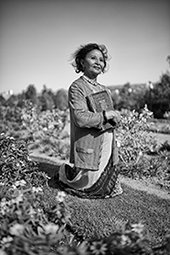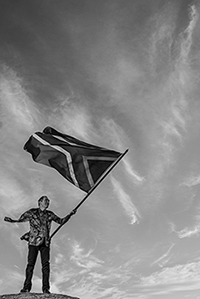
In Prayer and Protest - Sophia Williams De Bruyn |
The Johannes Stegmann Art Gallery, in partnership with 21 Icons, is hosting the 21 Years of Freedom Collection, an exhibition specially curated for the University of the Free State.
21 Icons celebrates a heroic past and inspires a hopeful future. The project was launched in 2013 as an initiative that uses film, photography and written narrative to celebrate the lives of extraordinary South Africans. It highlights people who have been catalysts in shaping society, on a local or global level and across a variety of contexts: in a social, political, environmental or artistic sense.
It is the brainchild of internationally renowned photographer and filmmaker Adrian Steirn, whose primary source of inspiration was the life of Nelson Mandela. In one way or another, all of the men and women featured in the project have extended his legacy, making a magnificent impact on South Africa and beyond.

Beautiful Sacrifice - Albie Sachs |
21 Years of Freedom features 21 icons from the first and second seasons of the project. It includes the last official photographic portrait of Nelson Mandela and many of his friends and fellow struggle heroes. Behind each portrait lies a carefully planned concept that captures the essence of each icon, capturing their spirit and distinct legacy.
Among the other extraordinary South Africans featured in this collection, are struggle icons Ahmed Kathrada and Advocate George Bizos, Archbishop Desmond Tutu, human rights and environmental activist Kumi Naidoo, celebrated storyteller Gcina Mhlophe, Nobel laureate Nadine Gordimer, activist and musician Yvonne Chaka Chaka, gender activist Sophia Williams De Bruyn and artist William Kentridge.

The Full Report - Zubeida Jaffer |
The 21 Icons was created as a movement for positive change. By sharing the stories of iconic South African men and women, the intention is to inspire new generations to follow in their footsteps. With the country celebrating 21 years of democracy but still grabbling with injustices, the message that everyone can do something to make a difference, is portrayed in these powerful and inspiring stories.
Writer-in-residence and well-respected journalist, Zubeida Jaffer, who features among the collection of 21 striking photographs, opened the exhibition saying, “I feel like I’m surrounded by a circle of energy from which I have been fortunate to draw strength …It’s a choice that we make…whether to draw energy from those who are positive and forward looking or to surround ourselves with people who are fearful. There is a lot to be fearful about in our country. We have lived through very fearful and difficult times. But to cope with these times, those people and many others have kept their focus on hope. They have kept their focus on what is possible…and what we would like South Africa to be in the future.”
For more information on 21 Icons: 21 Years of Freedom Collection contact the Johannes Stegmann Art Gallery at +27 (0)51 401 2706 or dejesusav@ufs.ac.za